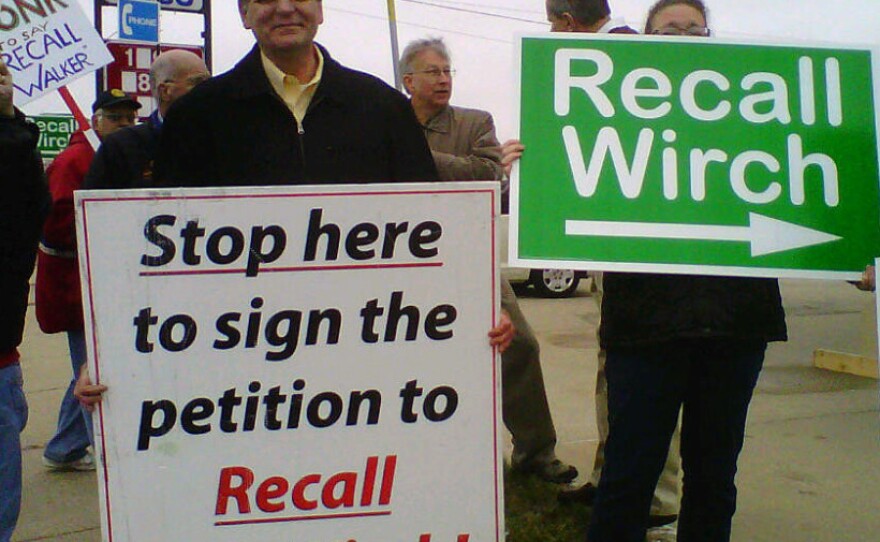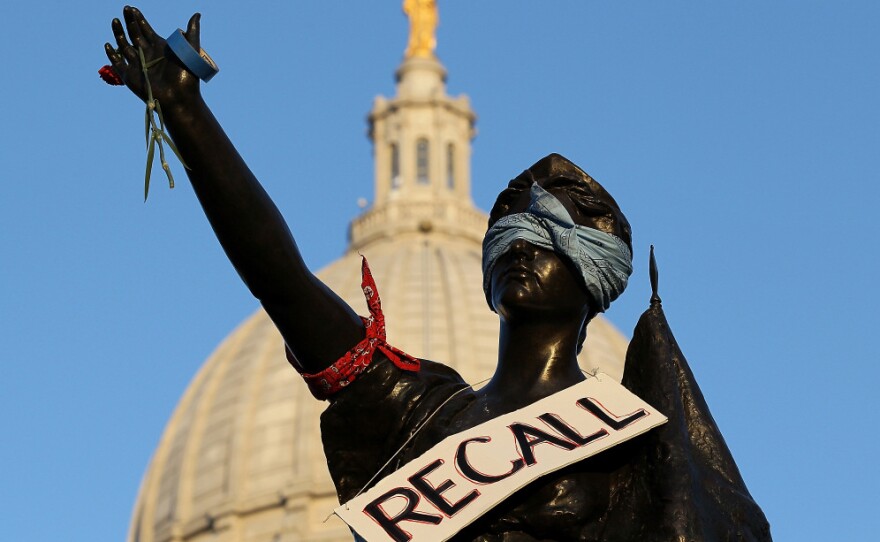In Wisconsin, the fight over collective bargaining has moved to a new phase: recall elections in several state Senate districts.
On Monday, volunteers and Democratic Party activists filed recall petitions against Republican state Sen. Luther Olsen.
He's now the third Republican in Wisconsin's Senate likely to face a recall election this summer — and more petitions are expected to be filed against other state senators this week.
As many as eight Republicans and eight Democrats could be forced into recalls as the battle over collective bargaining in the state heats up once again.
A 'Personal Affront'
It's something Loraine Lucinski never imagined herself taking part in.

Never more politically active than the occasional yard sign or bumper sticker, the 41-year-old mother of two is walking door to door on a cool, crisp April evening in Montello, Wis., a town of about 1,600 an hour or so north of Madison.
She's trying to get her neighbors to sign petitions to recall Olsen, a veteran lawmaker. It doesn't always go well.
"Hi! Can I take a minute of your time to talk with you about Sen. Olsen?" Lucinski asks one man.
"No, you ain't gonna talk to me about Sen. Olsen, 'cause I think he's a great man," he says. "And all the rest of them guys, too."
Feelings both for and against the collective bargaining law run strong here in Wisconsin. The law, currently on hold while it's challenged in the courts, takes away collective bargaining rights from most of the state's public employees. As an epidemiologist for the state health department, Lucinski says she feels like she's under attack.
It was such a personal affront to me, thinking, this is the American dream. You work hard, and now, OK, you're going to have $300 less in your check a month because we don't agree that you should have collective bargaining rights.
"It was such a personal affront to me, thinking, this is the American dream. You work hard, and now, OK, you're going to have $300 less in your check a month because we don't agree that you should have collective bargaining rights," she says.
Lucinski says she's voted for Olsen in the past, which is why she's so disappointed he went along with Wisconsin Gov. Scott Walker's plan to eliminate her collective bargaining rights.
On her door-to-door campaign, she does find support at the home of Irene Fritchey, who says the legislation pushed through by Republicans just isn't right.
"They bargained for that years ago," Fritchey says. "I mean, to take it away now, I don't see that."
The petition drive against Olsen in this central Wisconsin district is a success, with organizers filing close to 23,000 signatures with state elections officials on Monday — about 8,000 more than needed.
"Well, I mean, I wish the whole thing could've came down different, but it didn't," says Olsen. "But in essence, sometimes you have to make tough decisions."
Olsen says he tried working behind the scenes to broker a compromise on the collective bargaining legislation. But, he adds, he doesn't regret his vote.
Labor-backed Democrats hope to win at least three seats to flip control of the upper chamber their way. They say if their Wisconsin recalls are successful, it could send a chilling message to Republican-led efforts to end collective bargaining rights in other states, as well.

Democrats Targeted, Too
But as many as eight Democrats in the Wisconsin Senate could be facing recall elections of their own.
Standing in an abandoned gas station on a busy highway in Kenosha, Wis., Dan Hunt is leading the recall petition drive against Democratic state Sen. Bob Wirch.
"He left his job," Hunt says. "He stopped representing us, and that's a major thing."
Hunt says his involvement in the recall effort has nothing to do with the content of the collective bargaining bill. Instead, he's angry that Wirch and 13 other Democrats left the state to try to prevent a vote on the bill.
Hunt says if elected representatives just left every time they didn't like a bill, there'd be chaos.
They're supposed to be where they're supposed to be in order to debate, amend and vote. Just because you're going to be on the losing side doesn't mean you should take off and run away.
"I think that's the worst thing that a representative can do," he says. "They're supposed to be where they're supposed to be in order to debate, amend and vote. Just because you're going to be on the losing side doesn't mean you should take off and run away."
As a few drivers pull in to sign the petitions, others honk their support — though it's difficult to tell if they're supporting the drive to recall Wirch, or supporting counterdemonstrators with signs reading: "Honk if you want to recall Gov. Walker."
Hunt says that this week, his group will file more than enough signatures to force Wirch into a recall election this summer.
For his part, Wirch stands behind his decision to go to Illinois for three weeks to stall the bill, and says constituents stop him and thank him every day. He's confident he can defeat the recall effort.
Recalls are not unusual in Wisconsin — and they don't always succeed. But never before have there been efforts against so many legislators all at one time and over one issue.
Both sides of this fight are getting millions of dollars and dozens of paid canvassers from national political organizations — from labor unions and the Democratic Party, to the GOP, Tea Party activists and conservative groups such as Americans for Prosperity.
The deadline for filing recall petitions for all 16 eligible Wisconsin state senators is fast approaching, with the last of them due by early May.
Copyright 2022 NPR. To see more, visit https://www.npr.org. 9(MDAzMjM2NDYzMDEyMzc1Njk5NjAxNzY3OQ001))







